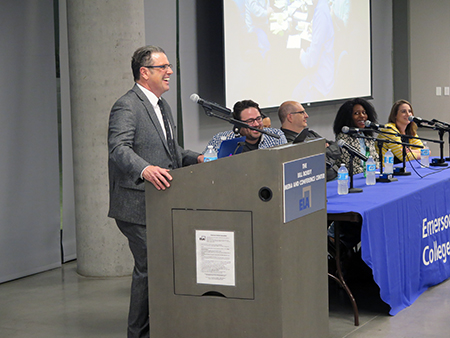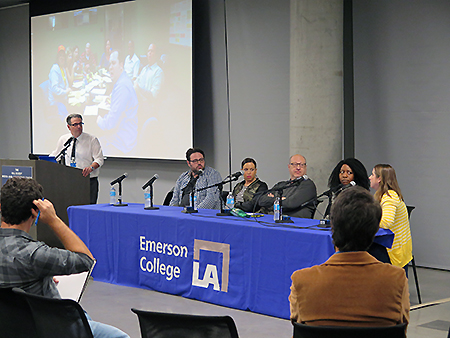TV Writers Discuss Life in the Writer’s Room
Writers from some of today’s hottest TV shows convened at Emerson College Los Angeles on November 16 for a panel moderated by Assistant Professor Manny Basanese, a working TV writer/producer himself, on life inside the writer’s room.
Amy Aniobi (Insecure, Silicon Valley); Jason George (Narcos, Scandal, Blacklist, Nashville); Andy Gordon (co-executive producer of Modern Family); Amanda Johns ’03 (Castle, Harry’s Law); and Lisa McQuillan (Dr. Ken, Blackish) spoke to an audience of students, alumni, and friends about what it’s like to work in a writer’s room, the importance of diversity, how to break into the business, and more.

Visiting faculty member Manny Basanese introduced members of the panel. Photo/Daryl Paranada
Panelists shared stories about working on various TV shows, offering anecdotes about why some writer’s rooms click and others don’t.
“Sometimes you just lock in when it’s really working. You can just feel it,” said George, referring to chemistry in the writer’s room. “That’s probably my favorite two minutes of the day.”
Johns said difficult days happen when personalities don’t gel or outside issues are brought into the room. Sometimes, she said, you need to know when to take a five-minute break.

Audience members listen to panelists discuss working in the writer's room. Photo/Daryl Paranada
Ariadna Torres-Cortez ’17, a Writing for Film and Television major, was one of the audience members heeding the panelists’ advice.
“It’s a great opportunity to be able to hear from writers and get their takes and experience entering the workforce,” said Torres-Cortez, who hopes to write for film or television one day. “It’s always good to hear from people who have been working in the industry for a while.”
When it comes to diversity, panelists said that while it’s gotten better in recent years, it’s still not great.
“Diversity in your room in every sense—age, gender, race—should be very important,” McQuillan told the audience. “The more people you get in your room who aren’t like you, the more different viewpoints you have and the better your stories are.”

From left: Amanda Johns ’03, Micah Stahl MFA '17, Amy Aniobi, Rob Eckard MFA '17, and Lisa McQuillan. Photo/Daryl Paranada
Many of the audience members attended the panel hoping to glean advice on how to make it into a writer’s room. Johns shared stories about how she started out as a production assistant, learning how everything works, and developing a reputation for being a problem solver. You just do whatever they say, she said. Eventually, she moved to the writer’s room.
“I just never came back without a fix,” Johns said. “You have to be flexible and know your environment.”
Panelists told aspiring TV writers that they should be helpful, but not annoying, and have both a spec and original pilot script ready for when the right opportunity arises.
“Figuring out what your story is, that’s so important,” said Aniobi, who encouraged writers to join writer’s groups to workshop their scripts. “You have to show that you’re unique.”

From left: Jason George, Lisa McQuillan, Andy Gordon, Amy Aniobi, and Amanda Johns '03. Photo/Daryl Paranada
Gordon encouraged the audience to find a way in by becoming writer’s assistants and said that scripts need to be excellent and grab the reader quickly.
“If I get to page five and I don’t know what the story is or I hit a joke and it bores me or I see a bunch of typos, I don’t read past that page,” said Gordon. “Make those first couple of pages really interesting.”
Alumna Sarah Dompkowski ’15 sat in the audience taking notes on the advice the panelists shared. Working in the industry as a research assistant, Dompkowski attended the panel to find out how to move closer to getting a job in the writer’s room. She also wanted to catch up with Basanese, her former professor.
“He gave me a lot of confidence in my writing I hadn’t had before,” said Dompkowski.
For Dan Houbrick ’15, a freelancer hoping to write for television one day, hearing from experienced writers and producers helped him realize there are many paths into the industry.
“You just have to keep plugging away at it,” said Houbrick. “I really enjoyed hearing their advice.”
Categories